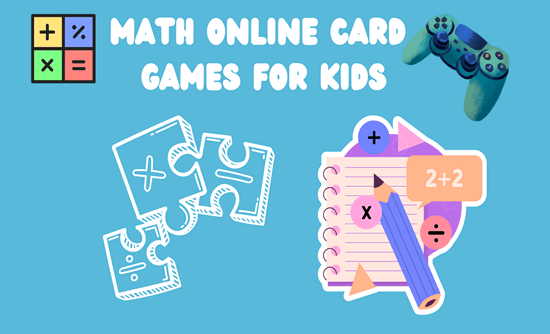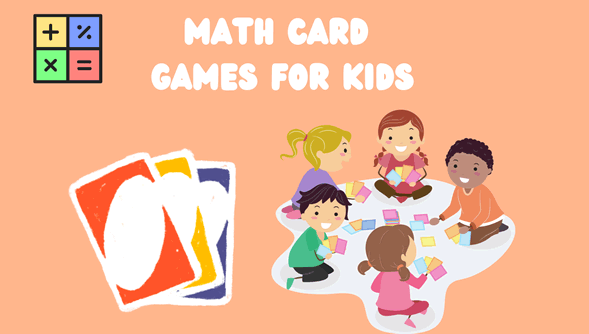Math Games To Play With A Deck of Cards
Introduction
Math games are not only entertaining but also an excellent way to enhance one's math skills. A deck of cards offers a versatile tool to engage children and adults alike in various math games. This article will explore the benefits of playing math games using cards, provide examples of games to try, and offer tips for making the most out of these activities.
Multiplication Games | Addition Games| Subtraction Games | Telling Time Games | Fraction Games |
Kindergarten Math Games

Play free preschool and kindergarten math games for kids. Fun math activities for kindergarten
Go to page1st Grade Math Games

Math games for 1st grade students to play games and practice different math topics. Maths games for class 1
Go to page2nd Grade Math Games

2nd grade math games for kids to play and practice math problems. Maths games for 2nd class
Go to page3rd Grade Math Games

3rd grade math games for kids to play and practice math problems. Maths games for class 3
Go to page4th Grade Math Games

4th grade math games for kids to play and practice math problems. Fun math activities for 4th graders
Go to page5th Grade Math Games

5th grade math games for kids to play and practice math problems. Cool math games for 5th graders
Go to page6th Grade Math Games

6th grade math games for kids to play and practice math problems. Math jeopardy 6th grade.
Go to page7th Grade Math Games

7th grade math games for kids to play and practice math problems. Math games for grade 7
Go to page
Table 1: Outline of the Article
| 1 |
|
| 1.1 |
|
| 2 |
|
| 2.1 |
|
| 2.2 |
|
| 2.3 |
|
| 3 |
|
| 3.1. |
|
| 3.2. |
|
| 3.3. |
|
| 3.3. |
|
| 3.4 |
|
| 4. |
|
| 4.1. |
|
| 4.2. |
|
| 4.3. |
|
| 5. |
|
| 6. |
|
Benefits of Math Games with Cards
Improves mental math skills
Playing math games with a deck of cards can significantly improve mental math skills. The games require players to calculate numbers quickly and accurately, which strengthens their arithmetic abilities over time.
Encourages strategic thinking
Math card games often require players to develop strategies to outwit their opponents. Strategic thinking skills are essential in many aspects of life, and honing them through fun games can be an enjoyable and practical way to learn.
Enhances social skills
Most math card games are designed for multiple players, promoting social interaction, collaboration, and communication. Playing these games helps develop social skills, especially in children.
Math Online Card Games

- Math zombie games with cards
- Crocodile games with dice and cards
- Math war games with boards and cards
- Dinosaur math games with boards, dice, obstacles and safe spaces
Best Math Games Using a Deck of Cards
1. Multiplication War
Multiplication War is a simple yet engaging game that helps players practice their multiplication skills. To play, divide a deck of cards evenly among the players. Each player turns over two cards and multiplies the numbers. The player with the highest product wins the round, and the game continues until one player has won all the cards.
2. Fraction Action
Fraction Action is an excellent game for understanding fractions and practicing addition with fractions. To play, assign the cards numerical values (ace = 1, 2-10 = face value, jack = 11, queen = 12, king = 13). Each player turns over two cards, creating a fraction with the first card as the numerator and the second as the denominator. The player with the highest fraction wins the round.
3. Target Number
Target Number is a game that challenges players to create mathematical expressions using addition, subtraction, multiplication, and division to reach a target number. To play, draw a target number card and four additional cards to use as operands. The first player to create a valid expression that equals the target number wins the round.
4. Sum Fun
Sum Fun is an easy-to-learn game that reinforces addition skills. To play, deal a set of cards to each player. Players take turns flipping over two cards and adding their values together.
The player with the highest sum wins the round. Continue playing until all cards have been used, and the player with the most rounds won is the overall winner.
5. Number Sandwich
Number Sandwich is a game that helps players practice their number recognition and comparison skills. To play, deal three cards to each player, who will arrange them to create the largest possible three-digit number. The player with the highest number wins the round. Repeat this process for several rounds, and the player with the most rounds won is the winner.
6. Math Snakes And Ladders Game
Mathematics is a challenging subject for many students, and it can be difficult for them to maintain interest in it. However, incorporating math games into the learning process can make it more enjoyable and easier to understand. One such game is the math snakes and ladders game, which combines the fun of a board game with the educational benefits of solving math problems.
What is Math Snakes and Ladders Game?
Math snakes and ladders is a board game that is similar to the traditional snakes and ladders game. It has a grid-like board with numbered squares and snakes and ladders that help players move up or down the board. However, instead of just rolling a dice and moving, players must solve math problems to determine the number of squares they move.
How to Play Math Snakes and Ladders Game?
To play the math snakes and ladders game, you need a board, dice, and math problem cards. The game can be played by two or more players, and the objective is to reach the end of the board before the other players.
Players take turns rolling the dice and answering a math problem card, which can be addition, subtraction, multiplication, or division. The player then moves the number of squares based on the answer they provided. If the player lands on a ladder, they move up the board, but if they land on a snake, they move down.
The game can be modified to suit different age groups and math levels, making it an ideal tool for teachers and parents to use to teach math concepts.
What are the Educational Benefits of Math Snakes and Ladders Game?
The math snakes and ladders game has several educational benefits, including:
1. Encourages Active Learning
Math snakes and ladders game requires players to be actively engaged in the learning process. They must solve math problems and apply their understanding of math concepts to move ahead in the game.
2. Reinforces Math Skills
The game reinforces math skills such as addition, subtraction, multiplication, and division. Players get the opportunity to practice their math skills in a fun and engaging way, which can help them retain the information better.
3. Develops Problem-Solving Skills
Math snakes and ladders game requires players to solve math problems to move ahead, which helps to develop their problem-solving skills. They must use their critical thinking skills to determine the correct answer to the problem, which can help them in other areas of their education.
4. Promotes Healthy Competition
Playing the math snakes and ladders game can promote healthy competition among players. They can use their math skills to outsmart their opponents and move ahead in the game. This can help to develop their confidence and self-esteem.
Conclusion
Math snakes and ladders game is an excellent tool to help students learn math concepts in a fun and engaging way. It offers several educational benefits, including reinforcing math skills, developing problem-solving skills, and promoting healthy competition.
FAQs About The Snakes and Ladders Game
- Is math snakes and ladders game suitable for all age groups?
Math snakes and ladders game can be modified to suit different age groups and math levels, making it an ideal tool for teachers and parents to use to teach math concepts.
- Can math snakes and ladders game be played by a single player?
Math snakes and ladders game is designed to be played by two or more players, but a single player can also play by competing against themselves to improve their math skills.
- What math skills can be reinforced by playing the math snakes and ladders game?
Tips for Playing Math Card Games
Customize difficulty levels
To make the games accessible to players of all ages and abilities, feel free to adjust the difficulty level. For example, younger children may need to stick to addition and subtraction, while older children and adults can incorporate multiplication and division.
Make it a fun and engaging experience
Math games should be enjoyable, so keep the atmosphere light and entertaining. Encourage laughter and friendly banter among players. You can also offer small rewards for winners to increase motivation and engagement.
Encourage teamwork and friendly competition
Some math card games can be played in teams, which fosters collaboration and communication skills. Encourage players to help each other and engage in friendly competition to create a positive gaming experience.
Additional Math Card Games
6. Countdown
Countdown is a game that challenges players to use their mental math skills and creativity to reach a specific target number. To play, draw six cards as operands and one card as the target number. Players must use addition, subtraction, multiplication, and division to create an expression using the six cards that equals the target number. The first player to find a valid expression wins the round.
7. Highest Product
In Highest Product, players use their multiplication skills to create the largest product possible with their cards. To play, deal three cards to each player. The players must multiply the three cards to create the highest product they can. The player with the highest product wins the round.
8. Math Solitaire
Math Solitaire is a single-player game that helps improve arithmetic skills. To play, lay out nine cards in a 3x3 grid. Using any combination of addition, subtraction, multiplication, and division, try to create a horizontal, vertical, or diagonal line of three cards that equals a predetermined target number. Replace the cards you used with new ones and continue playing.
Tips for Encouraging Math Skill Development
Celebrate small victories
Acknowledge and celebrate small achievements in math games to build players' confidence and motivate them to keep improving their skills.
Incorporate different learning styles
Consider the various learning styles of players when designing or modifying math card games. Visual learners may benefit from games that use colors or symbols, while kinesthetic learners might prefer games that involve movement or hands-on manipulation of cards.
Discuss strategies and tactics
After playing a math card game, take some time to discuss the strategies and tactics used by the players. This conversation can help players learn from each other and develop a deeper understanding of the math concepts involved.
Conclusion
Math card games offer a wealth of opportunities for players to practice and improve their math skills while having fun. By trying a variety of games and adapting them to suit the players' abilities and interests, you can create an enjoyable and educational experience that encourages lifelong learning and a love for mathematics. Math games with a deck of cards offer a fun, interactive way to improve mental math skills, strategic thinking, and social abilities. By playing games like Multiplication War, Fraction Action, Target Number, Sum Fun, and Number Sandwich, players of all ages can enjoy practicing their math skills while engaging in friendly competition.
Frequently Asked Questions
1. Can I use regular playing cards for math games, or do I need special cards?
You can use a standard deck of playing cards for most math games. Assign numerical values to face cards (jack, queen, and king) to incorporate them into the games.
2. Are math card games suitable for all ages?
Yes, math card games can be adapted for players of all ages and skill levels. Adjust the rules or difficulty to match the players' abilities.
3. How can I incorporate more advanced math concepts into card games?
For more advanced players, you can include concepts like square roots, exponents, and algebraic expressions in your math card games.
4. Can I create my own math card games?
Absolutely! Feel free to invent new games or modify existing ones to suit your needs and preferences.
5. How can I make math card games more engaging for younger children?
To keep younger children engaged, use colorful cards, incorporate storytelling elements, and offer small rewards for winning rounds or completing challenges.
6. Can I combine different math concepts in a single game?
Yes, you can combine various math concepts in a single game to create more complex challenges and increase the educational value of the activity.
7. How can I encourage reluctant learners to participate in math card games?
To engage reluctant learners, choose games that align with their interests, use themes or characters they enjoy, and offer small rewards or incentives for participation.
8. Are there any math card games specifically designed for adults?
Many math card games can be adapted for adults by increasing the difficulty or incorporating more advanced math concepts. Additionally, some games like poker and blackjack have inherent math components that can be enjoyed by adults.
9. Can math card games help with test preparation?
Yes, math card games can help reinforce math skills and concepts that may appear on standardized tests, making them a valuable supplementary learning tool for test preparation.
10. Can I use math card games as part of a homeschooling curriculum?
Math card games can be a valuable addition to a homeschooling curriculum, providing a fun and interactive way to practice math skills and reinforce concepts learned during formal lessons.











